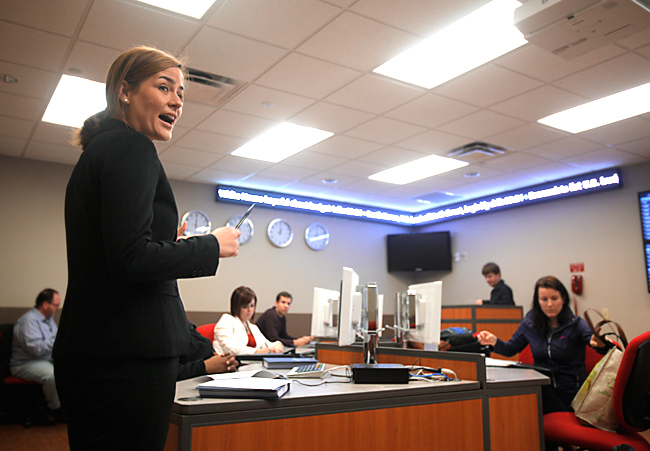UTC gets plugged in
Sunday, March 20, 2011
 Lauren Templeton teaches a class in the Bloomberg Lab at the University of Tennessee at Chattanooga. The school of business at UTC has installed a stock ticker in the campus-side lobby of its Fletcher Hall, and has another ticker in a classroom in the same building.
Staff photo by Jake Daniels/Chattanooga Times Free Press
Lauren Templeton teaches a class in the Bloomberg Lab at the University of Tennessee at Chattanooga. The school of business at UTC has installed a stock ticker in the campus-side lobby of its Fletcher Hall, and has another ticker in a classroom in the same building.
Staff photo by Jake Daniels/Chattanooga Times Free PressBuy three, get nine free.
That's how the UTC College of Business was able to acquire a dozen $23,000 Bloomberg stock market terminals for the department's new initiative, a plan designed to popularize the Finance Department with women.
Currently about 10 of every 300 finance majors are female. That's significantly different from the rest of the university, where women easily outnumber men, said Kristina Montague, assistant dean of external affairs.
The $1.5 million initiative came as the College of Business was ranked among the top business schools in the nation for the fifth year in a row, according to Bloomberg Businessweek.
Instead of drab brick, a colorful stock ticker now greets visitors to the College of Business, bringing a taste of the financial universe to Fletcher Hall. This sexier, flashier approach to finance already is yielding dividends for the department, administrators say.
"Emory [University] only has one of these terminals," said Montague. "This is a huge competitive advantage for us."
The Bloomberg devices, which plug directly into financial trading floors around the world, are part of a push to rebrand the traditionally highbrow world of trading in the eyes of potential finance majors, especially female ones.
Lauren Templeton, niece of famed investor Sir John Templeton and now director of UTC's initiative, initially got students' attention when she auctioned off six $1 bills for $16 as part of a demonstration of how trading works.
"We make it more fun, and the students are more engaged this way," she said.
She personally hopes to diversify the demographics in finance, where she has found success at Templeton Capital Management.
At present, women manage only 3 percent of assets in the hedge fund industry, perhaps because they're naturally more risk-averse, she said. In fact, Templeton believes that men are twice as likely as women to sell at the bottom and buy at the top; a great way to get poor fast.
Beata Knizat, a second-year MBA student, said word of mouth from the program already is attracting female students from other disciplines.
"I don't know if anything specific with the layout is going to attract women, but the way the program is being advertised will, as will the presence of a well-known female hedge fund manager," Knizat said.
Christopher Beechwood, an MBA student who graduates in May, said he hadn't noticed an influx of women yet.
"The finance classes are mostly men, but I'm hoping that in the future, more women will do it," Beechwood said.
Students are taught that for a variety of reasons ranging from behavioral to hormonal, women tend to be less risk averse and drawn more to literature than math, he said.
For that reason, "I think we're focusing on the way that we teach finance, making it more of a puzzle and not as much about formulas," Beechwood said.
To add interest, Templeton uses the Bloomberg terminals to simulate a typical day in the finance world. Students have a set amount of cash with which to establish positions, and whoever has the most money at the end of the day wins.
She sometimes crashes the "market" to provoke a panicked reaction, and the class can later analyze each student's actions in the moments after a financial free fall begins.
After a few practice sessions like these, Templeton's students got good enough to compete at the Rotman Trading Competition in Toronto, a sort of financial Olympics that simulates a real-life trading floor. There, UTC's team promptly won the interest rate derivative test against teams from University of Chicago, Northwestern University and more, though MIT ultimately won the overall competition.
Though they didn't win the entire competition, winning wasn't exactly the point. The students got to have fun doing something that mimics a behavior they may find themselves doing professionally after graduation, and that's not an opportunity that's available at most business schools, she said.
"A lot of people think finance is boring," Templeton said. "It's clearly not."